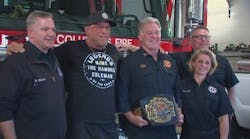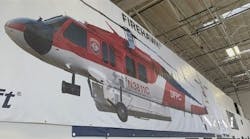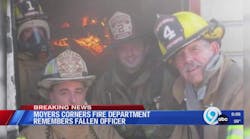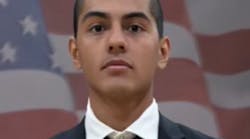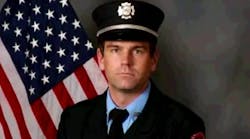The candle wax that used to add two inches to the sidewalk has long been scraped off. Inside the firehouse, the walls have been coated with a fresh layer of off-white paint, and the kitchen has been refurbished with new cabinets. Most of the lockers — walk-in spaces, really — have been emptied out and reassigned. And half of the faces are new, forming a low-key junior fraternity that is more likely to melt into the scenery than the previous crew of cut-ups and free spirits.
One year after losing 12 men in the Sept. 11 terror attack, the elite Squad 1's firehouse in Park Slope, Brooklyn, bears little physical resemblance to the devastated place that quickly became a depository for grief and memorial gifts from all over the world. Talk to anyone affiliated with the squad, and you sense that the firefighters have done their Herculean best to forge ahead emotionally, too.
But it is impossible to block those spontaneous, bittersweet moments. Not when someone barks into the microphone in a manner reminiscent of Dave Fontana's spot-on impersonations of Homer Simpson. Not when someone breaks out the ice cream and chuckles at the memories of Pete Carroll hiding all the Häagen-Dazs bars inside frozen loaves of bread. Not when someone talks Giants or Jets and jokes about how the teams could have used Brian Bilcher, a burly offensive lineman on the Fire Department's own team whose nickname was Tugboat.
Journeying from cynosure of unfathomable loss to symbol of gritty recovery, Squad 1 has offered a snapshot of an unparalleled year of crushing sadness weathered by a Fire Department that lost 343 men in less than two hours on the morning of Sept. 11.
As chronicled in a series of articles in The New York Times, Squad 1 has lived through the draining recovery efforts at ground zero, the neighborhood's unstinting desire to keep the firehouse open, one heartbreaking holiday after another and too many funerals to bear. Those chapters, in turn, have thrust several people into the limelight: the firefighter who also lived through the crash of American Airlines Flight 587 in his Queens neighborhood; the widow who gained unwanted fame; the fatherless boy who struggled through a trying school year.
Small wonder, then, that as the first anniversary looms, the firefighters are exhausted. They are frayed. In fact, the new man in charge, Capt. Richard Portello, has refused all news media requests for interviews or access to the firehouse — even for this final article in the series — and ordered his firefighters to keep mum.
But in recent days, interviews with several firefighters, as well as with the firefighters' widows, have yielded enough information to provide a poignant yearbook. If one theme pervades throughout, it is that while everyone is striving to return to normal, no alterations, whether cosmetic or substantive, can make the memories of Sept. 11 any easier to swallow.
Not now, anyway. Maybe not ever.
"They're trying to make it nice, trying to change it a little, take away some of the bad memories," said Bobby West, who recently retired after 23 years with Squad 1. "But it's hard. It's really hard."
Half of the 24 men now assigned to Squad 1 are new, including 4 who joined in August and 3 of the unit's 4 officers. The new group has an average of eight years' experience, while eight are under the age of 35. The men who died had an average of 13 years on the job, and only two were under 35.
Moreover, if the prototypical Squad 1 member was a highly motivated, Type A personality, then the new breed is better epitomized by an enthusiastic but muted firefighter who can blend in with the crowd and defer to his seniors.
Or so says Battalion Chief Bart Codd, who, as the interim leader of Squad 1 between September and March, recruited most of the new men.
"That was the most important criteria: getting guys who could fit in with the guys who were left," said Chief Codd, who left Squad 1 after he was promoted from captain to battalion chief. "There may have been guys with better qualifications, more time on the job, but I didn't have a good feel for them. I thought, maybe at this point in time, we need to heal and move forward."
It was imperative, Chief Codd said, that the new recruits gauge the mood of the veterans still haunted by loss. It was crucial that they demonstrate a zest for learning. It was preferable that they stay in the background, whenever necessary.
So far, the men have received high marks in filling the shoes of James Amato, Brian Bilcher, Gary Box, Thomas Butler, Pete Carroll, Robert Cordice, Eddie D'Atri, Michael Esposito, Dave Fontana, Matthew Garvey, Michael Russo and Steve Siller.
At first, the depleted squad worked longer 24-hour shifts, versus the normal two-shift system of 9 hours during the day tour, and 15 during the night. It was never easy, not with the omnipresent reminders. It was especially tough, some said, in the still, evening hours, ripe for introspection.
"All these guys were hurting terribly," said one firefighter who joined after Sept. 11. "You just want to get in there, show them you're willing to learn, and give them their space, let them be who they were before."
The funerals were hard to handle. The last service was just a few weeks ago; it was for Thomas Butler. But remains of only five men from Squad 1 have been identified to date.
While the newcomers have been unfailingly courteous and respectful, they have also realized that it is sometimes better to say nothing.
"Most of the new guys feel left out and find it hard to talk with the wives," said Tina Bilcher, whose husband, Brian, had only recently joined Squad 1. "It's really awkward. They want to comfort us, but they don't know what to say."
Over time, as the new firefighters kept arriving — three in January, five in March and April, four in August — the men devoted most of their time to training. In fact, an unofficial mentor system developed between the old guard, whose average age is 39, and the new.
"It made the day go by fast," Mr. West said. "They were learning something. You were teaching. Everybody was happy. And it was a distraction from dealing with 9/11."
There is a defined universe of roles within the Fire Department. Engine companies are the first to respond to calls. Ladder companies ventilate burning buildings and search for occupants. Rescue companies free civilians and any firefighters trapped by fire and debris.
The squads, in turn, are the masters-of-all-trades, the men with specialized training to work under water, in tight spaces and with hazardous materials. The men who can roll out hoses, dash into burning buildings and even, in a pinch, offer medical assistance.
It has been a busy year for Squad 1. But one of the highlights, clearly, was fighting the first few fires, with old hands and new, working as a team.
"I'm sure it was very hard for them to come to the firehouse, but they really stood up and did a good job," one veteran firefighter said. "A lot of them don't have much experience, and everyone makes mistakes, but if I could address them all, I would tell them they did the right thing, and I appreciate it."
If anything, says Capt. Edmund T. Staines, who was the leader of Squad 1 for five years before retiring in 1994, the house feels cozier now. Before, two guys would be playing chess, one would be watching television, while someone else would be balancing his checkbook.
Now, Captain Staines said, "even when I go in to visit, the new guys are together, and everyone is huddling together, just hanging out with each other."
Always present in everyone's thoughts, of course, are the firefighters' widows and the two dozen or so children left behind. And the widows say that they have been buoyed by countless acts of kindness.
One wife of a veteran firefighter, ever thoughtful, sends cards and notes to all the families on holidays and special occasions, said Marian Fontana, Mr. Fontana's widow, who has become a reluctant celebrity as the president of the 9/11 Widows' and Victims' Families Association.
Even people who occasionally call the firehouse, or drop by to say hello, have noticed a looser atmosphere of late.
"Before, they'd always be so quiet and concerned and asking you, `Are you all right?' " said Kathleen Box, whose husband, Gary, was one of the squad's biggest pranksters. "But since the summer, they've been joking around a bit more, and it's nice to hear."
The humor is all the more remarkable, given the difficult year the entire Fire Department has endured because of a surge in retirements, overtime pay and second-guessing over its Sept. 11 strategy.
At Squad 1, at least three men have been promoted or transferred, including Firefighter Sean Cummins, who got a position with the prestigious Rescue Company 1 in Manhattan. This summer, he has been summoned to military duty as a paratrooper with the Air National Guard, and spent time in the Middle East, according to Air Force officials.
Meanwhile, three of the most senior men retired. With a combined experience of approximately 77 years, Firefighters West, Fred Lawrence and Tim Rogers — who were affectionately called the Evil Triad — all decided to hang up their uniforms, in no small part because of the loss of their colleagues.
Mr. West, who will be 46 on Friday, found it painful to be at the firehouse, day after day. Too many fond memories of wisecracks, paintball outings and whitewater rafting excursions.
"I was talking to them, even after they were gone," said Mr. West, who now is a consultant for a company that manufactures fire-protection gear. "Half of the guys who were gone were at my wedding a few years ago."
Mr. Lawrence, 45, offered a similar explanation. "You walked into work," he said, "and you looked at the pictures of the guys gone. It wasn't fun anymore."
For most of its 25-year existence, the firehouse — which is at 788 Union Street, just off Seventh Avenue, Park Slope's main artery — has enjoyed a cordial if sometimes distant rapport with its neighbors. With the exception of Mr. Fontana, just about all the other firefighters lived outside the neighborhood, mostly in Staten Island or on Long Island.
But after Sept. 11, neighbors started fund-raising drives and collected $54,000, mostly in small cash donations. When word got around late last September that the Fire Department was considering shuttering Squad 1, thousands of people rallied in front of the firehouse. In the end, the firehouse stayed open; the Fire Department said it was all a misunderstanding.
Since then, the relationship between firehouse and community has only strengthened. The door to the firehouse is open more often. The firefighters often shop at the Park Slope Food Co-op next door. Neighbors do more than wave or nod; they stop in to chat, offer words of encouragement, bring their children to check out the equipment.
"My whole outlook totally changed," said one veteran firefighter. "I kind of stereotyped the people of Park Slope before: very superliberal. But now I see them as people who are extremely nice, bringing their children up with very good values."
Then again, who can blame the firefighters for feeling overwhelmed by the good will and new media attention? After all, there have been innumerable well-wishers from such close locales as Japan and Germany bearing gifts and beseeching photographs. And the firefighters, ever gentlemanly, find it hard to say no.
As the anniversary approaches, it is only fitting, the firefighters say, that the gifts that once swallowed up the ground floor have been relocated to a more discreet location upstairs. The message is clear: yes, we must remember, but yes, we must move on.
But please, Captain Staines said, do not forget that Squad 1 did not lose just 12 men on Sept. 11. There were another dozen or so with connections to Squad 1 who also died that day, including Chief Raymond M. Downey, who commanded the department's rescue units. He was Squad 1's first captain.
The men who continue to treasure their Park Slope affiliation pay close attention to such things, because before Sept. 11, 2001, Squad 1 had not lost a single firefighter in the line of duty.
From The New York Times on the Web (c) The New York Times Company. Reprinted with Permission.

